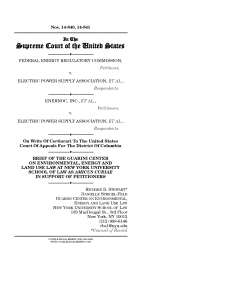The Guarini Center has submitted an amicus curiae brief to the Supreme Court supporting the US government’s position in the case EnerNOC v. Electric Power Supply Association.
The outcome of this case will determine the extent to which the Federal Energy Regulatory Commission (FERC) can regulate demand response programs in wholesale energy markets. These programs pay consumers for reducing their electricity consumption when demand is high, such as on hot summer days.
The brief argues that the Court should reverse the D.C. Circuit’s holding below, which took a restrictive interpretation of FERC’s jurisdiction, and thereby preserve FERC’s authority over wholesale demand response programs. The brief emphasizes that these programs play a critical role in promoting the performance of the organized wholesale electricity markets that FERC regulates by enabling market operators to meet electricity needs through the lowest cost means available. Wholesale demand response programs benefit consumers by reducing the cost of electricity, and can confer environmental benefits, such as facilitating the incorporation of renewable energy sources in the electricity system.
For over fifteen years, FERC has worked step by step to incorporate demand response programs into the wholesale energy markets as the Commission has become increasingly convinced of the benefits such programs provide. The D.C. Circuit decision could undo this long and careful process. The brief accordingly urges the Supreme Court to reverse the Court of Appeals’ jurisdictional decision.
The brief was a collaborative effort of the Guarini Center’s Faculty Director Richard B. Stewart, Energy Program Director Katrina M. Wyman, and Executive Director Danielle Spiegel-Feld. Michael Lenoff, a member of the JD class of 2007, provided research assistance.
